DevSecOps is quickly becoming an invaluable tool for organizations striving to protect their software and data. By leveraging the collaborative efforts of development, security, and operations teams, DevSecOps is able to create a unified strategy for safeguarding an organization’s infrastructure. This approach is capable of simplifying the integration of security measures into an existing system, as well as improving compliance with industry-specific guidelines such as GDPR. As a result, DevSecOps is becoming an increasingly attractive option for organizations looking to ensure the safety of their software and data.
At its core, DevSecOps is a unified approach to software engineering that focuses on the collaboration of development, security, and operations teams. By leveraging the collective expertise of all parties involved, DevSecOps creates a single strategy for protecting an organization’s data and software. This unified strategy allows teams to quickly identify potential threats and respond in an efficient manner. Additionally, it enables teams to collaborate on security measures, which can help reduce the amount of time needed to implement new solutions. By streamlining security measures, DevSecOps also enables teams to quickly identify any potential risks and respond accordingly.
The primary advantage of DevSecOps is its ability to streamline the integration of security measures into an existing infrastructure. Through DevSecOps, organizations can create a comprehensive plan for ensuring compliance with industry-specific regulations such as GDPR. Additionally, this approach allows teams to quickly identify potential threats and respond in an efficient manner. This unified strategy also enables teams to collaborate on security measures, which can help reduce the amount of time needed to implement new solutions. Finally, by streamlining security measures, DevSecOps also enables teams to quickly identify any potential risks and respond accordingly.
In addition to simplifying integration and improving compliance, DevSecOps also helps expedite the process of identifying and responding to potential threats quickly. By leveraging the collective expertise of all parties involved, DevSecOps is able to create a unified strategy for responding to potential threats quickly and efficiently. This approach allows teams to coordinate their efforts and take decisive action when needed. Additionally, by streamlining security measures, DevSecOps enables teams to quickly identify any potential risks and respond accordingly.
The primary intention of DevSecOps is to create a unified strategy that allows all parties involved to be accountable for upholding security standards. This approach allows teams to quickly identify potential threats and respond in an efficient manner. Additionally, it enables teams to collaborate on security measures, which can help reduce the amount of time needed to implement new solutions. By leveraging the collective expertise of all parties involved, DevSecOps can also create a comprehensive plan for ensuring compliance with industry-specific regulations such as GDPR.
In order for DevSecOps strategies to be effective in safeguarding an organization’s infrastructure, it is important for organizations to ensure that all parties involved are properly trained and knowledgeable in the respective fields of development, security, and operations. Through proper training and education, organizations can ensure that all members of their team are properly equipped with up-to-date knowledge on industry best practices when it comes to security measures. Additionally, organizations should strive to ensure that their DevSecOps strategies are regularly reviewed and updated in order to stay ahead of any potential threats or security risks.
Finally, organizations should also consider implementing automation tools in order to further streamline the process of integrating security measures into their existing system. Automation tools such as continuous integration/continuous deployment (CI/CD) pipelines can help expedite the process of implementing new security measures while also simplifying the overall process. Additionally, automation tools can help reduce human errors that may otherwise occur when manually implementing changes or updates to existing systems.
In conclusion, DevSecOps has become an increasingly attractive option for organizations looking to ensure the safety of their software and data. By leveraging the collaborative efforts of development, security, and operations teams, DevSecOps is able to create a unified strategy for safeguarding an organization’s infrastructure. Additionally, this approach simplifies the integration of security measures into an existing system, as well as improving compliance with industry-specific guidelines such as GDPR. Furthermore, by streamlining security measures through automation tools such as CI/CD pipelines and proper training and education of personnel involved in DevSecOps strategies, organizations can ensure they remain ahead of any potential threats or security risks. Finally, by streamlining security measures, DevSecOps also enables teams to quickly identify any potential risks and respond accordingly. As a result, DevSecOps has become a powerful tool for organizations looking to ensure the safety of their data and software in an efficient and reliable manner.

